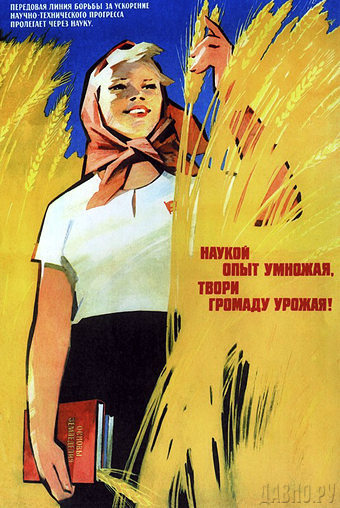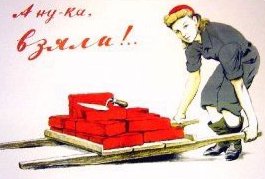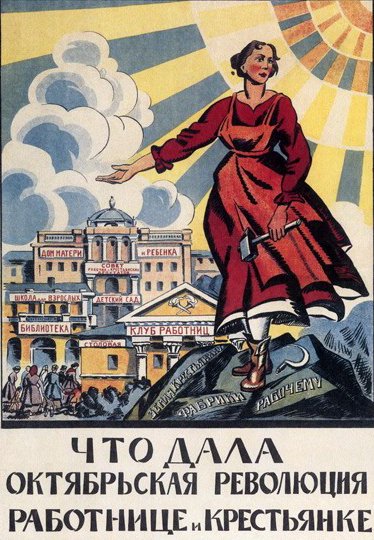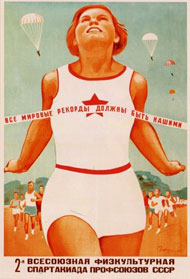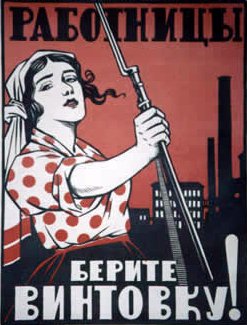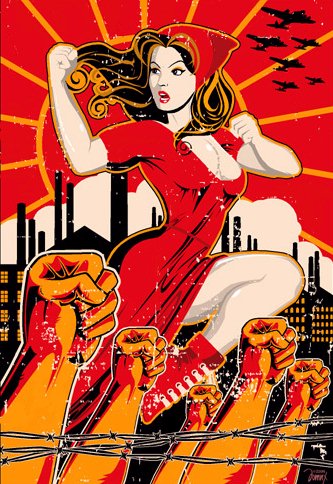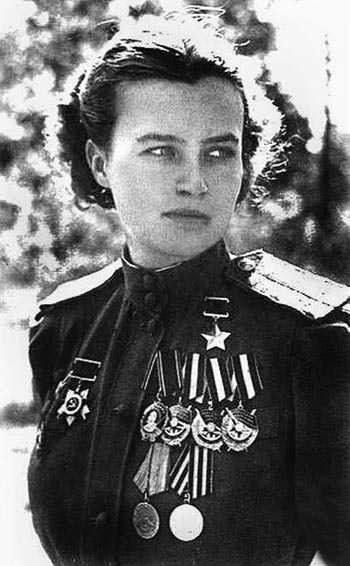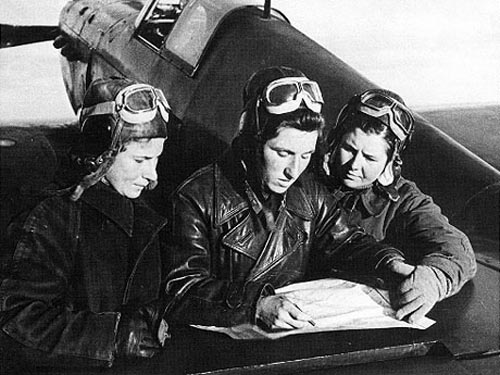 |
||||
|
Russian Women After the Revolution
Broken PromisesBy Priti Patel - January 2008. They were promised that life would be better. They were given hope that the revolution would benefit them all. After the fall of the tsarist regime, Russia’s leaders changed many things. That meant that women were at last equal to men. According the communist manifesto, all persons were equal, therefore should be paid similarly, receive equal working hours as well above many things. What many people failed to realize is that though there were many changes taking place, some things, unfortunately, very much stayed the same. There was the mentality that women were inferior beings. Since the beginning of time and well into the tsarist empire, women were thought to be mere possessions; easily controlled and, if needed, easily replaced. Women did not have respect, did not have many rights, and had little education. Among the population, women were the ones who were most illiterate. They stayed at home and took care of the children and that was their duty. In most people’s mind, they were way beneath the standards of men. Women were assigned to harsher jobs than men, and also faced many difficulties and prejudices at the workforce. Women who actually took advantage of the opportunity offered by the central planners were looked down upon for leaving their place, which was the home. Even party members, who fiercely embraced communism, were not fully committed to this part of the plan.
Legally, women were considered at least some what equal to men, but deep down, many males still held onto the notion that they were the dominant parties in society. Even though they addressed everyone as “Comrade” did not mean they actually believed them to be at the same level. Many women were weary of other women who chose to break out of their social boundaries. Politics was, and still is, a man’s game and any women who dared to venture into that realm were seen as dishonest. Women had a tendency to vote for a man because he was a man. The inferior mindset still existed and was rearing its ugly head.
Another difficulty that hindered the complete emancipation of women was the interference of the church. Religion was an important factor in Russian society. Russian Orthodoxy was the state’s official religion for many years. It only further influenced the already warped attitude many males had towards women. The religion believed in patriarchy; men should be the head of their families and had all the power when making major family decisions. With these principles, it further influences the strange mindsets of men and women alike during those time periods. The church greatly opposed the idea of women working outside of the home front and these values were common among church goers, which made up the majority of the vast population. Lenin, leader of the Bolsheviks, fought hard for the rights of women. He believed that Russia had won its battle against capitalism but to finally get rid of it, they would need to work hard and change many things; the role of women being one of them. He was one of the few party members who wholeheartedly supported the emancipation of women. The party helped women all over overcome their difficulties. They increased schools so improve illiteracy rates. They gave equal job opportunities to women at the job force. Also, they gave them their well deserved rights that helped them in social aspects.
It was easier for the average woman to get an abortion, get married, get divorced and still have custody. The state also controlled daycare centers for women to drop off their children when she needed to go to work.
The party believed that the legalization of prostitution led to inequality and capitalism; therefore they firmly opposed the selling of the female body and severely enforced it. With all these new rights and freedoms, women finally had their own identity. With these new identities, they created political organizations that fought for the rights of women in Russian society. The number of political associations for the benefits of women steadily grew. These groups worked closely worked with party leaders. With the congregation and traditional prejudices against them, many were glad they had the state to back them. However that support was lacking in certain areas. Party members advocated the freedom of women and gender roles, yet still held onto their traditional values. “Yes, it was okay that women went spoke out in politics, as long as it is not my wife or daughter” was a common thought among party member. Hypocrisy was roaming rampant among comrades alike. Also, women were the first to lose funding when times got tough. Programs designed to aid women were the first to feel the pressure when the economy wasn’t doing well.
Complete parity had not been reached yet. The feminist movement was growing, but it lacked the support by fellow women in the country. Then, there was the war. With one third of the male population of working age sent to war, women were left to fill the work place. Some women even enlisted in the army. By working and receiving the wages they deserved, women got the confidence that they were lacking in themselves. With the men gone, feminists took advantage of the situation and passionately advocated for equal treatment between the two genders. As well, many feminists used passive force to get their point across. They used fashion and image to direct their point. Many women received short haircuts, wore more masculine clothing and spoke harshly to inform the public about their cause. Many women also followed this trend to show their support for the feminist movement. Their participation in the war, among other things, eventually led to the emancipation of women in Russia. Living in a communist country officially gave equal opportunity to minorities, but it did not guarantee that they will not be discriminated against. Russian women, like in any other country, had to fight for their rights, until they were taken seriously. Many things have changed from that time, but sadly, some things still stay the same. Even though the situations have varied, the idea and principle –that women are inferior to women- is evident in our society and we need to find a way to demolish it. Let us hope we find the same strength and courage these women did to fight the evils of misogyny.
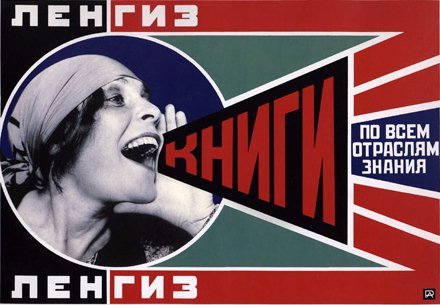
Natalya Meklin and the Night WitchesBy Suzanne MacNevin - January 2008. Hero of the Soviet Union, Lt. Natalya Fedorovna Meklin flew 982 night combat missions during the course of World War II in an antiquated U-2/Po-2 biplane. She was later promoted to captain, awarded numerous medals and after the war became a writer. The Night Witches, the regiment Natalya Meklin flew with, were one of three women's only regiments formed by another Hero of the Soviet Union Marina Raskova in October of 1941. Marina Raskova was a famed pre-war aviator, primarily for the flight of the Rodina, an ANT-37 aircraft flown by three women, which set a world distance record. After setting the record Marina Raskova was forced to bail out when they ran out of fuel, and spent a week alone in the Siberian wilderness before she found her crashed plane, and her comrades (who had crashed landed). The women were all given the Hero of the Soviet Union award. In October 1941 Raskova convinced Stalin and the Soviet government to create three women's regiments: The 586th IAP (Fighter Aviation Regiment), the 587th BAP (Bomber Aviation Regiment), and the 588th NBAP (Night Bomber Aviation Regiment). The 587th would later be renamed the 125th GvBAP (Guards Bomber Aviation Regiment) and the 588th would later be renamed the 46th Taman Guards Bomber Aviation Regiment. The 588th/46th is much better known as the "Night Witches."
The 586th IAP was put on home defense duty, not as a frontline unit. As a result it achieved mixed results. It was later integrated with men during the war, even having a male commander, and by the end of the war it was nearly fifty percent male. Two women, the most famous female aviators of all time, left the 586th to join male regiments in Stalingrad and fight. Those women were Lidia "Lily" Litvyak and Yekaterina "Katya" Budanova. Both of these women transferred out of the 586th and ended up in front line service in Stalingrad. They first arrived in the 9th GIAP, but were quickly transferred to the 73rd GIAP. It was there that they achieved most of their victories. Lily Litvyak achieved 12 personal kills, plus several shared. Katya Budanova achieved 20 personal kills. Both women died in combat in the summer of 1943, fighting alone against swarms of German fighters.
|
|
|||
|
|
||||
|
|
||||
 |
|
 |
||
